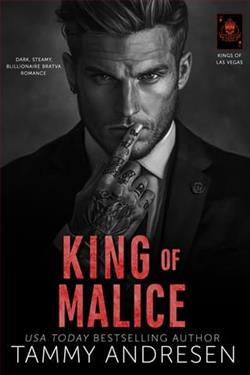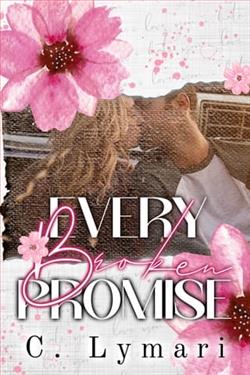Page 65 of The Bear's Heart
She shook her head. “My mother did die when my youngest brother were born. My father, ’e did live a little longer, but ’e were in an accident in the quarry where ’e were workin’, and ’e were all crushed. That were two year since. I do care for my brothers and sisters now. They be my family.”
I’d seen her when, as a frightened visitor to the past, I’d first come here, and the fact that she might have had a story to tell had completely passed me by. Now, here I was, so enmeshed in this world, a past which had now become my present, that I at last had time to take an interest in the people who inhabited it. And here before me stood a girl without parents, little more than a child herself, who had the responsibility of caring for her younger siblings.
“Where do you all live?” I asked.
This time I sensed her blush hid more than self-consciousness. She looked down at her brown bare feet and shifted as though uncomfortable at my question. “I do ’ave a bed ’ere in the palace. My brothers and sisters, they ’ave to live in a room I do rent for ’em. My next brother, ’e do work down at the wharf, but ’e’s not a big lad yet, so ’e can’t carry much. ’E don’t get a lot o’ work, nor money.”
“Oh.” I patted the bench beside me. “Sit down, Bretta, and tell me about your brothers and sisters.”
There were an astonishing six of them altogether. Every child born to her mother had by some miracle managed to survive, despite their poverty, with the older ones taking responsibility for the younger ones as each arrived.
She was proud of them all. “Even Pwyll, the youngest born, ’e be able to earn ’imself a crust fer sweepin’ up fer the stall ’olders in th’market.”
But from what she said, it appeared to be a hand-to-mouth existence, precarious in the extreme, with her earnings disappearing into the void that was the rental for their single tiny room.
I wormed the truth about the room out of her. “We ’ave but one room fer all on’us. It do b’long to my master. ’E do charge us top rate, I suspicion.”
I wasn’t so blind as not to know people still lived like this in the twenty-first century. Yet to hear how this motherless family lived, while my life was cushioned in the comparative luxury of the Imperial Palace, disturbed me, and reminded me of the vow I’d made on my first visit to Caer Baddan. As I’d ridden through the filthy freezing streets, I’d seen half-naked children grubbing through the rubbish piled in the gutters, searching for something to eat. Right then I’d decided that if I had to marry Arthur and become his queen, I’d make it my mission to try to help the poor, and in particular the defenseless children.
I’d made a start with the orphaned children of Caerwysg, and now the time had come to do the same for the ones closer to home.
When I broached the subject later with Arthur, his reply wasn’t quite what I was after. “Caer Baddan comes under the jurisdiction of Melwas. He’s overlord here, holding this city as subking to me.”
I raised my brows in a silent question, suppressing the shiver that threatened to run down my back at the mention of that man’s name.
“That means he rules this area,” he explained. “Bassus is his man, as Melwas should be mine. That’s the way things work.”
“Then surely you can order Melwas to make provision for all the homeless children here? Get him to provide them with food and shelter?”
Arthur pulled a wry face. “You’d think so, but in practice it doesn’t happen quite like that. Melwas is practically autonomous. He owes me taxes in kind, which he pays at harvest time, but it would be hard for me to force him to do something so bizarre as provide for his poor. He’d see it as untoward interference. And in a way, I’d agree with him. They’re his people to do with as he likes.”
“What’s the point of him being your subking if you can’t make him do what you want?” I was annoyed, thwarted by his arguments. I’d fondly imagined it would be an easy task to help these children. In fact, I’d thought I could get Arthur to make provision for their shelter and care himself. I’d never imagined it would depend on Melwas’s goodwill.
Something glimmered in his eyes. “I suppose I could suggest this to him…” He spoke slowly, as though an idea had occurred to him. “I could make it difficult for him to refuse…” He stared over my head. “It’s within my rights to increase the taxes he pays to me. I could threaten to do so if he doesn’t sort out the problem within his city, and take action against him if he fails to obey me…” He seemed lost in his own thoughts, as though these remarks weren’t directed at me at all.
“Can you do that? Force him to act before winter sets in?” In my head I could see a proper house for the orphans, people to take care of them, food on the table and clothes on their backs. Maybe apprenticeships for them too, like the children at Caer Pensa.
A slow smile spread across Arthur’s face. “I could try.” The smile became grim. “I could certainly try.”
The man in charge of Caer Baddan during Bassus’s absence in the countryside was one Kirwin, a solid, middle-aged and rather servile man with no pretensions to being Roman whatsoever. When Arthur explained what we wanted, he seemed inclined to agree that it would be beneficial to get the poor children off the streets. Listening to his practicalities, though, convinced me he had a different reason for wanting this. Quite simply the presence of poor child beggars in the city was bothersome and to be frowned upon.
“I want you to make sure Bassus gets this message,” Arthur said, from where he sat in the ornate chair in Bassus’s audience chamber. The room had been decorated in terracotta paint to waist level and above that with murals of a hunting scene. The huntsmen, hounds and fleeing herd of deer raced around the walls in perpetual motion. The chair was almost a throne. Merlin had told me it had been installed and used by the Emperor Constantine III, Arthur’s great grandfather, soon after he’d had the palace built.
Arthur, in a dark tunic and braccae which gave no hint of his status, leaned back in the chair, long legs extended. Only the golden circlet in his hair told Kirwin he stood in the presence of a king– that, and Arthur’s bearing and autocratic tone.
“Yes, milord.” Kirwin almost scraped the ground with the top of his head, so low was his bow. “You’re right that we need to clear the streets of these homeless children. I’m sorry the sight of them so upset the Queen.” His too-close-together eyes slid sideways to look at me.
I was sitting beside Arthur on a somewhat less elaborate seat, the one perhaps that Kirwin himself might have occupied when Bassus held court. I narrowed my eyes at him, but didn’t interrupt.
“Let me make it clear.” Arthur steepled his fingers. “These children are the responsibility of your king. You must tell Bassus as soon as he returns, and make sure he informs Melwas. He must deal with this problem before the cold of winter sets in and the children suffer more. My wife has a kind disposition. She can’t bear to see them cold and hungry. Do I have your word?”
Kirwin bowed again, giving us another good view of the flaky bald spot on the top of his head. “Yes indeed, milord.” He was gabbling. “I’ll make certain that your orders are carried out.” His eyes swiveled toward me once more. “Milady the Queen need not worry herself any longer. And may God bless her own child thrice over.”
I wasn’t sure we should trust him. He didn’t look a kind man to me, and I felt that was what was required here; a Samaritan, not a bean counter, which Kirwin undoubtedly was. When Kirwin had gone and we were back in our chambers, I mentioned this to Arthur.
“Don’t worry.” He pulled me onto his lap. “I’ll send messengers to both Bassus and Melwas detailing our requirements, and include the threat of increased revenues when the harvest is over. I think…” Here he paused and that same far-away look came over his face again. “I think he’ll find his wisest course of action is to comply.”
I didn’t know why, but a wave of cold unease washed over me as though someone had drenched me in iced water.















